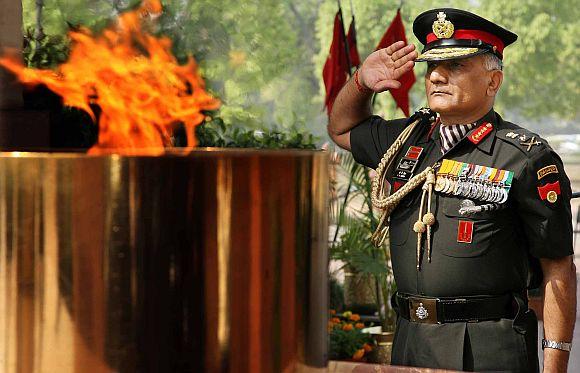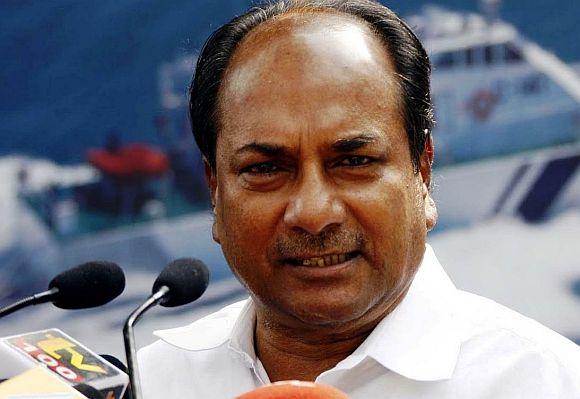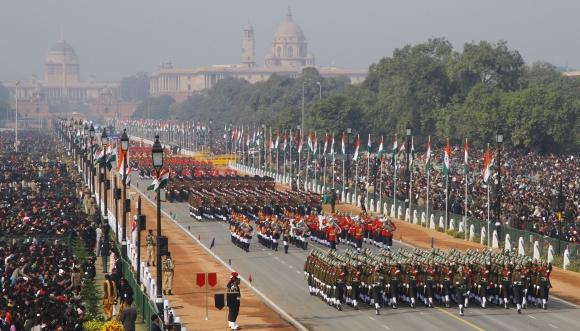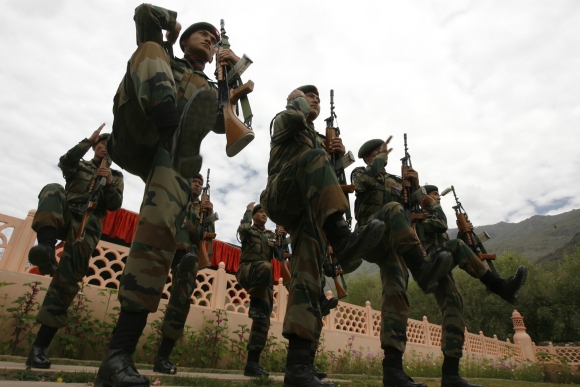 | « Back to article | Print this article |
No winner in defence row, nation is only loser
Citizens must remember that the job of the armed forces is to 'protect' democracy, NOT practice it. Neither is it the primary job of the Army chief or the defence minister to eradicate corruption. Their primary or the only job is to ensure that the armed forces of the republic are adequately armed and equipped to face the likely enemy and emerge victorious. Everything else is secondary and only in the nature of aim plus, says Colonel (Dr) Anil Athale
In the current fracas between the ministry of defence and Army chief, there are no winners but a certain loser -- the nation. The situation has been made worse by the saturation television coverage and ignorant and haranguing anchors looking for sensational and 'breaking news' rather than any reasoned debate. Television in any case is not a medium given to serious analysis. TV thrives on 'bytes', so we have a spectacle of a member of Parliament, convicted in a corruption scam, asking for the Army chief's head!
But out of this rather unwelcome event, some good has come out -- for a change security threats to the country and the armed forces' readiness to meet them has come into the national limelight. In our election-driven democracy, this is indeed an exception. For the fact is, no one can win the elections by campaigning on the issue of national security. The controversy has thrown up several issues and it is necessary to sift the grain from the chaff.
The current controversy started with the Army chief making the sensational disclosure that very early in his tenure, nearly a year and a half ago, he was 'offered' a bribe in an indirect way by a retired service officer. Before that matter could die down, came a 'leak' of a top secret letter written by the Army chief to the prime minister, drawing his attention to the woeful state of the Army's preparedness for war.
The background to all this was of course the date of birth controversy that forced the Army chief to go to the Supreme Court, where he lost the battle. The entire political establishment more or less stood behind the government as it saw the latest disclosures as the Army chief's revenge against a government that did not agree on his contention on DOB. Linked to the DOB was the succession battle for the post of chief of army staff.
Click NEXT to read further
The 'battle of the generals'
It is undoubtedly true that there was right royal 'battle of the generals' going on for some time. The actions by General VK Singh in the Sukna land scam and the 'Adarsh' scam had upset a lot of persons.
It seems they struck back at him through the DOB issue to limit his tenure. General VK Singh has been fighting his case on the DOB issue for a long time, much before he became the chief. All this while, the ministry of defence, instead of acting decisively and in a fair manner, appears to have taken sides or let the anti-Army chief lobbies prevail.
What was earlier only a technical matter has now become a prestige issue between the general and the civilian establishment. It is no wonder that the Army chief has fought, and fought hard. A quiet dialogue with the general accepting his DOB and he accepting the old DOB for retirement was entirely possible, but was missed out.
Self-belief and ego are an integral part of a soldier's mental makeup, something that must be clearly understood by the citizens on the civil street. Without these two ingredients a soldier cannot even enter a battlefield, leave alone be successful. It also must be clearly understood by the political leadership that while the Army chief is certainly subordinate to the political head, that is the prime minister, but in times of war, it is he, the Army chief, that carries the responsibility of defending the nation and NOT the prime minister. In order to carry out this task successfully and command and control his army, it is the chief who has the power of reward and punishment over his men.
That is the source of his authority. In dragging the office of the Army chief in controversies and thwarting his appointments etc, the civilian component of the ministry of defence left him with no choice but to strike back.
Corruption in defence deals has become the front page news and both the Army chief and defence minister seem to be in competition to prove that they are the only 'honest' people. The emphasis has shifted to processes and procedures and not the outcome. While this battle goes on, the losers in any deal have been cynically exploiting the media, judiciary and Parliament to spite their competitors.
The end result is that from critical night vision devices to mountain guns and tank ammunition, the armed forces are facing shortages. One expected the honest leaders to take the lead and be concerned with the outcome and not process. The enemy is not going to show restraint to wait for our procedures to be completed before striking. The rate at which India seems to be blacklisting defence firms, the only ones left in the fray would be companies making potato chips! Alas, they do not make guns.
Click NEXT to read further...
India has an unrealistic attitude to 'lobbying'
This also raises the larger question of our utter failure to develop indigenous capacity to equip our soldiers. But for this root cause, much of the corruption issue would not exist.
A word about 'agents' in arms deals. Unfortunately, we in India take an unrealistic attitude to what the rest of the world calls 'lobbying'. This is not such a dirty word, else what is advertising? Instead of an unworkable blanket ban on all 'agents' and lobbying, it will be best to follow the American model of registering all the lobbyists and bringing transparency into the deals.
A law also needs to be passed that once a deal has been duly entered into by the government after Cabinet approval, it should not be open to post-facto judicial scrutiny. In the end, we have to trust the highest political leaders, democratically elected, to act in the national interest. National interest and defence of the country and the means needed to carry it out are NOT subjects for judicial review.
The issue of the Army chief's letter to the prime minister drawing his attention to the inadequacies in the Army ought not to be an issue at all. It is the duty of the chief to do so. What is wrong is its leakage to the media. That must indeed be enquired into quickly, the culprit found and punished. But now that the issue of shortages is out in the public; the government must not merely issue bland statements like 'the matter is being looked into', etc.
The government owes it to the people to tell us what concrete action it is taking and in what time frame. This is of special significance, as the situation is volatile in our neighbourhood to the West and China is flexing its muscle to the North.
Citizens must remember that the job of the armed forces is to 'protect' democracy, NOT practice it. Neither is it the primary job of the Army chief or the defence minister to eradicate corruption. Their primary or the only job is to ensure that the armed forces of the republic are adequately armed and equipped to face the likely enemy and emerge victorious. Everything else is secondary and only in the nature of aim plus.
Click NEXT to read further...
In wars there is no runner-up position
One wishes to end this on a personal note. As a young captain on the eve of the 1971 India-Pakistan war this author was commander of the medium machine gun (or MMG for short) platoon holding eight machine guns. To the uninitiated, the data from both world wars and other battles shows clearly that the machine gun is one of the most effective weapons in war.
The MMGs have to often fire non-stop. The firing pin is one of the most critical items for this kind of operation and often breaks during firing. Soldiers are trained to quickly change this under battle conditions even at night. But there was a major problem, the ordnance had a shortage of firing pins and we had barely three to four spares for eight MMGs.
I suggested to the commanding officer (CO for short) that I would go to nearby Batala town (famous for its foundries and skilled workshops) and get a few 'unauthorised' copies made so that our guns do not stop firing at a crucial moment in war.
The pragmatic CO agreed, gave me the required money from the battalion funds. The end result was that out 'Made in Batala' firing pins performed better than the government factory issue, the guns fired well and the battalion carried out its task of capturing the enemy bridge at Dehra Baba Nanak.
Both the CO and this young captain broke several rules (using unauthorised spare parts in weapons) and using regimental funds for purchase. Ask many veterans and you will come to know many such stories of ignoring the rule book and getting things done.
My request to honourable MPs, please do not doubt the integrity of the men in uniform and look at all their actions through the prism of procedures and rules.
In wars there is no runner-up position.
Colonel (Dr) Anil Athale is former head of War Studies Division, ministry of defence, and is coordinator for the Pune-based think tank Inpad (Initiative for Peace and disarmament)




